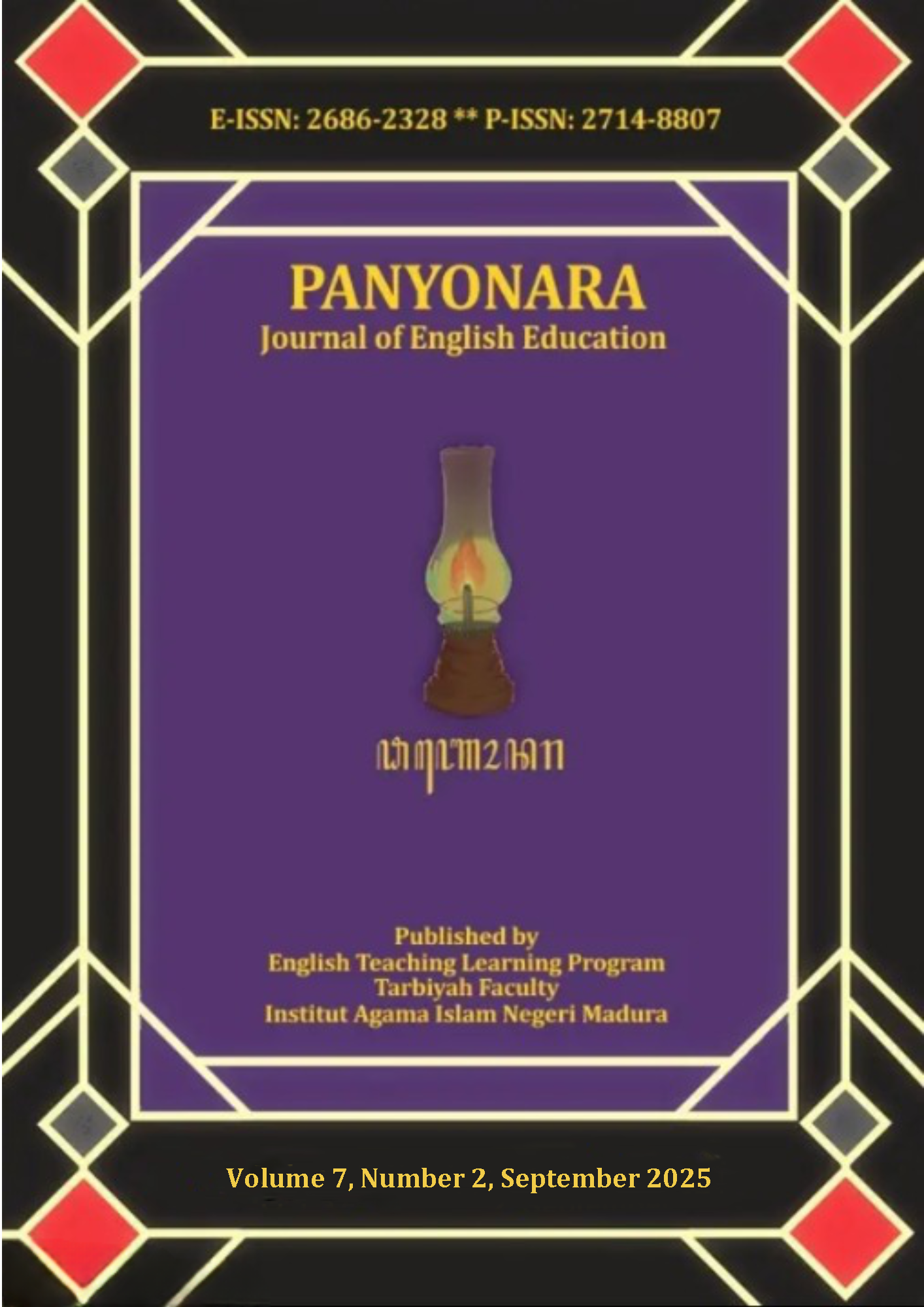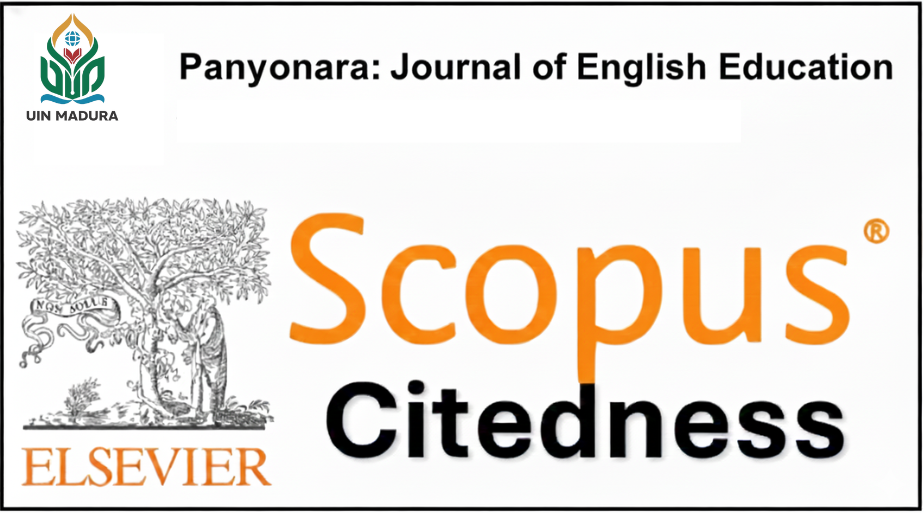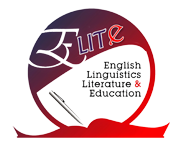Students' English Competence, Transformative Thinking, Creativity, and Work Readiness in the Gig Economy Era
 Abstract views: 277
,
Abstract views: 277
,
 PDF downloads: 124
PDF downloads: 124
Abstract
Abstract: As the gig economy era reshapes the global workforce, job readiness demands more than technical skills. Therefore, transformative thinking, creativity, and English competence become crucial. This study aims to explore how students from various backgrounds perceive the importance and the role of English competence, transformative thinking, and creative thinking in the gig economy era. Furthermore, this study also analyzes the relation between students’ socioeconomic background and their level of English competence toward their job readiness. Using a descriptive qualitative approach, data were collected through a reflective instrument based on open-ended questions designed to explore students’ views and strategies in facing the challenges of the gig economy era. Fifty-one students with different characteristics, including high and low achievers and socioeconomic backgrounds, volunteered for the study. Thematic analysis was used to identify mindsets and work readiness that emerged from their narratives. The findings revealed that English competence is strongly related to self-confidence, professional communication effectiveness, and the ability to build global connections. Meanwhile, transformative and creative thinking encourages students to think critically, adapt to change, design creative solutions, and think outside the box. Furthermore, developing work readiness requires motivation, engagement, and reflective thinking because these qualities enable students to adapt, learn, and perform well regardless of their financial situation.
Downloads
References
Adely, F. I. J., Mitra, A., Mohamed, M., & Shaham, A. (2021). Poor education, unemployment and the promise of skills: The hegemony of the “skills mismatch” discourse. International Journal of Educational Development, 82, 102381. https://doi.org/https://doi.org/10.1016/j.ijedudev.2021.102381
Agussalim, A., Mukhlis, I., Rohayati, S., Wahyuni, W., & Said, S. (2024). Unemployment of vocational high school graduates: The effect of work skills, family socio-economic status, and entrepreneurial attitudes on work readiness. Jurnal Ekonomi Pendidikan Dan Kewirausahaan, 12(2), 187–204.
Ahmad Tajuddin, S. N. A., Bahari, K. A., Al Majdhoub, F. M., Balraj Baboo, S., & Samson, H. (2022). The expectations of employability skills in the Fourth Industrial Revolution of the communication and media industry in Malaysia. Education+ Training, 64(5), 662–680.
Akyıldız, S. T., & Çelik, V. (2020). Thinking outside the box: Turkish EFL teachers’ perceptions of creativity. Thinking Skills and Creativity, 36, 100649.
Almada, M. C., Bramlett, D., & Ramírez, H. (2018). Getting Real about Career Readiness: A Focus on Cross-Sector Competencies. Online Submission.
Auld, G., O’Mara, J., Cloonan, A., Delphine, T., Eyers, A., Nicholas, M., Ohi, S., Paatsch, L., Pangrazio, L., & Quick, J. (2022). Examining the paradoxes children experience in language and literacy learning. The Australian Journal of Language and Literacy, 45(2), 183–198.
Braun, V., & Clarke, V. (2024). Thematic analysis. In Encyclopedia of quality of life and well-being research (pp. 7187–7193). Springer.
Castro-Carracedo, J. M. (2024). INSPIRing Change in English Language Teacher Education Integrating 21st Century Skills and Critical Pedagogy. Педагогика, 96(9), 1254–1273.
Cogo, A., & Yanaprasart, P. (2018). “English is the language of business”: An exploration of language ideologies in two European corporate contexts.
Cottafava, D., Cavaglià, G., & Corazza, L. (2019). Education of sustainable development goals through students’ active engagement: A transformative learning experience. Sustainability Accounting, Management and Policy Journal, 10(3), 521–544.
Curran, N. M. (2020). Intersectional English (es) and the gig economy: Teaching English online. International Journal of Communication, 14, 20.
Dewi, U. P., & Setiadi, C. J. (2018). Language attitude and language choice in bilingual academic learning environment. Lingua Cultura, 12(4), 369–373.
Du, J., Ma, E., Cabrera, V., & Jiao, M. (2021). Keep your mood up: A multilevel investigation of hospitality employees’ positive affect and individual creativity. Journal of Hospitality and Tourism Management, 48, 451–459.
Fitriati, A., & Wardani, M. M. S. (2020). Language attitude and language choice among students in Yogyakarta. International Journal or Humanity Studies, 3(2), 112–117.
Group, W. B. (2024). Global Economic Prospects. https://www.worldbank.org/en/news/press-release/2024/06/11/global-economic-prospects-june-2024-press-release
Hahm, S., & Gazzola, M. (2022). The value of foreign language skills in the German labor market. Labour Economics, 76, 102150.
Haslam, D., Mejia, A., Thomson, D., & Betancourt, T. (2019). Self-regulation in low-and middle-income countries: Challenges and future directions. Clinical Child and Family Psychology Review, 22, 104–117.
James, A., & Nunamaker, T. (2021). The Communication Competency: Exploring Student Intern and Employer Communication DifferencesNo Title. National Association of Colleges and Employers. https://www.naceweb.org/career-readiness/competencies/the-communication-competency-exploring-student-intern-and-employer-communication-differences/
Janairo, E. R. (2024). TRANSFORMATIVE LEARNING AND IDENTITY IN A RE-ENTRY JOB SKILLS PROGRAM.
Jiaojiao, L., & Lifei, M. (2023). The Dilemma and Thinking of Gig Workers in the Digital Organization Environment. Information Systems and Economics (2023) Clausius Scientific Press, Canada, 4, 29–34. https://doi.org/10.23977/infse.2023.040606
Joglekar, Y., Purdy, D., Brock, S., Tandon, A., & Dong, A. (2022). Developing digital communication competency in the business classroom. Business and Professional Communication Quarterly, 85(2), 141–168.
Joshi, A., Sekar, S., & Das, S. (2024). Decoding employee experiences during pandemic through online employee reviews: insights to organizations. Personnel Review, 53(1), 288–313.
King, R. B., & Trinidad, J. E. (2021). Growth mindset predicts achievement only among rich students: Examining the interplay between mindset and socioeconomic status. Social Psychology of Education, 24(3), 635–652.
Leasa, M., Papilaya, P. M., Batlolona, J. R., & Nuniary, S. (2023). Project-based Learning: Changing Students’ Scientific Thinking to Be Creative from Waste Natural Materials. Jurnal Penelitian Pendidikan IPA, 9(1), 350–359.
Lin et al., 202. (2021). Defining the gig economy: platform capitalism and the reinvention of precarious work. International Journal of Sociology and Social Policy, 41(9/10), 1012–1025.
Liu, K., & Ball, A. F. (2019). Critical reflection and generativity: Toward a framework of transformative teacher education for diverse learners. Review of Research in Education, 43(1), 68–105.
Mahoney, J. L., Weissberg, R. P., Greenberg, M. T., Dusenbury, L., Jagers, R. J., Niemi, K., Schlinger, M., Schlund, J., Shriver, T. P., & VanAusdal, K. (2021). Systemic social and emotional learning: Promoting educational success for all preschool to high school students. American Psychologist, 76(7), 1128.
McGreavy, B., Haynal, K., Smith-Mayo, J., Reilly-Moman, J., Kinnison, M. T., Ranco, D., & Leslie, H. M. (2022). How does strategic communication shape transdisciplinary collaboration? A focus on definitions, audience, expertise, and ethical praxis. Frontiers in Communication, 7, 831727.
McKay, S. L. (2018). English as an international language: What it is and what it means for pedagogy. RELC Journal, 49(1), 9–23.
Muhawenayo, J., Habimana, O., & Heshmati, A. (2022). Foreign language skills and labour market earnings in Rwanda. Journal of Education and Work, 35(6–7), 719–734.
Nghia, T. L. H., Anh, N. P., & Kien, L. T. (2023). English language skills and employability: a theoretical framework. In English Language Education for Graduate Employability in Vietnam (pp. 71–93). Springer.
Noble, K. G., McCandliss, B. D., & Farah, M. J. (2007). Socioeconomic gradients predict individual differences in neurocognitive abilities. Developmental Science, 10(4), 464–480.
Nugroho, N. E., Irianto, J., & Suryanto, S. (2024). A SYSTEMATIC REVIEW OF INDONESIAN HIGHER EDUCATION STUDENTS’AND GRADUATES’WORK READINESS. Jurnal Ilmiah Ilmu Terapan Universitas Jambi, 8(1), 350–363.
Rahayu, R., & Indriyanti, D. R. (2023). An ethnosains based project based learning model with flipped classroom on creative thinking skills. Jurnal Penelitian Pendidikan IPA, 9(8), 348–355.
Rehman, H. M., Adnan, N., & Moffett, S. (2024). Innovation bloom: nurturing sustainability in urban manufacturing transformation amidst Industry 4.0 and aging workforce dynamics. Annals of Operations Research, 1–39.
Ritter, B. A., Small, E. E., Mortimer, J. W., & Doll, J. L. (2018). Designing management curriculum for workplace readiness: Developing students’ soft skills. Journal of Management Education, 42(1), 80–103.
Rodríguez Aboytes, J. G., & Barth, M. (2020). Transformative learning in the field of sustainability: a systematic literature review (1999-2019). International Journal of Sustainability in Higher Education, 21(5), 993–1013. https://doi.org/10.1108/IJSHE-05-2019-0168
Roshid, M. M., & Kankaanranta, A. (2025). English communication skills in international business: Industry expectations versus university preparation. Business and Professional Communication Quarterly, 88(1), 100–125.
Satpathy, S., Dash, K. K., & Mohapatra, M. (2020). A study on the new design thinking for industrial revolution 4.0, requirements and graduate readiness. Rupkatha Journal on Interdisciplinary Studies in Humanities, 12(4).
Sengonul, T. (2022). A Review of the Relationship between Parental Involvement and Children’s Academic Achievement and the Role of Family Socioeconomic Status in This Relationship. Pegem Journal of Education and Instruction, 12(2), 32–57.
Sholikah, M. (2021). Roles of Career Maturity Mediating the Effects of Locus of Control and Socioeconomic Status on Career Readiness. International Journal of Evaluation and Research in Education, 10(3), 781–789.
Singh, A., & Jaykumar, P. (2019). On the road to consensus: key soft skills required for youth employment in the service sector. Worldwide Hospitality and Tourism Themes, 11(1), 10–24.
Stephens, A., & Francis, D. (2018). English learners in STEM subjects: Transforming classrooms, schools, and lives. National Academies Press.
Suna, H. E., Tanberkan, H., Gür, B., Perc, M., & Özer, M. (2020). Socioeconomic status and school type as predictors of academic achievement. Journal of Economy Culture and Society, 61, 41–64.
Talmage-Rostron, M. (2024). How Will Artificial Intelligence Affect Jobs 2024-2030. https://www.nexford.edu/insights/how-will-ai-affect-jobs
Teng, W., Ma, C., Pahlevansharif, S., & Turner, J. J. (2019). Graduate readiness for the employment market of the 4th industrial revolution: The development of soft employability skills. Education+ Training, 61(5), 590–604.
Teoh, M. W., Wang, Y., & Kwek, A. (2024). Deconstructing transformations: educational travellers’ cross-cultural transformative experiences. Journal of Hospitality and Tourism Management, 58, 506–515.
Vega, H., Howell, E., Kaminski, R., & Bates, C. C. (2024). Reaching teachers of early multilingual learners through professional development: A systematic literature review. Journal of Multilingual and Multicultural Development, 1–17.
Warschauer, M. (2000). The changing global economy and the future of English teaching. TESOL Quarterly, 34(3), 511–535.
Williams, L., Jordan, K., & McLaughlin, T. (2025). “They want people who are not me”: low socioeconomic status students’ WIL experiences. Higher Education, 1–18.
Yildiz, M., & Scharaldi, K. (2015). Cultivating Transformative Educator Model Among Pre-service Teachers While Integrating Global Competencies, Critical Thinking and 21st Century Skills: A Transdisciplinary Approach. Society for Information Technology & Teacher Education International Conference, 1760–1769.
Yosintha, R., & Arochman, T. (2020). Preparing English department students for industry 4.0 era through critical thinking skills development. ICLLT 2019: Proceedings of the 1st International Conference on Language and Language Teaching, ICLLT2019, 12, 159–172.
The journal uses an Open Access policy under a Creative Commons Attribution-NonCommercial 4.0 International License. Authors who publish with this journal agree to the following terms:
- Authors retain copyright and grant the journal right of first publication with the work simultaneously licensed under a Creative Commons Attribution License that allows others to share the work with an acknowledgment of the work's authorship and initial publication in this journal.
- Authors are able to enter into separate, additional contractual arrangements for the non-exclusive distribution of the journal's published version of the work (e.g., post it to an institutional repository or publish it in a book), with an acknowledgment of its initial publication in this journal.
- Authors are permitted and encouraged to post their work online (e.g., in institutional repositories or on their website) prior to and during the submission process, as it can lead to productive exchanges, as well as earlier and greater citation of published work.

















